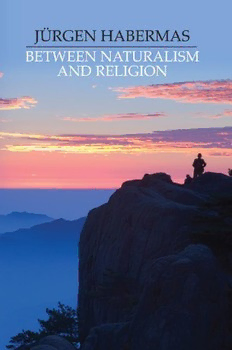
Between naturalism and religion: philosophical essays PDF
Preview Between naturalism and religion: philosophical essays
Between Naturalism and Religion Between Naturalism and Religion Philosophical Essays By Jürgen Habermas Translated by Ciaran Cronin polity First published in German as Zwischen Naturalismus und Religion © Suhrkamp Verlag Frankfurt am Main, 2005 This English edition © Polity Press, 2008 Polity Press 65 Bridge Street Cambridge CB2 1UR, UK Polity Press 350 Main Street Malden, MA 02148, USA All rights reserved. Except for the quotation of short passages for the purpose of criticism and review, no part of this publication may be reproduced, stored in a retrieval system, or transmitted, in any form or by any means, electronic, mechanical, photocopying, recording or otherwise, without the prior permission of the publisher. ISBN-13: 978-07456-3824-9 ISBN-13: 978-07456-3825-6 (pb) A catalogue record for this book is available from the British Library. Typeset in 11 on 13 pt Berling by SNP Best-set Typesetter Ltd, Hong Kong Printed and bound in India by Replika Press Pvt Ltd For further information on Polity, visit our website: www.polity.co.uk The publication of this work was supported by a grant from the Goëthe-Institut Contents Introduction 1 Part I The Intersubjective Constitution of Norm-governed Thought 9 1 Public Space and Political Public Sphere – The Biographical Roots of Two Motifs in my Thought 11 2 Communicative Action and the Detranscendentalized “Use of Reason” 24 3 On the Architectonics of Discursive Differentiation: A Brief Response to a Major Controversy 77 Part II Religious Pluralism and Civic Solidarity 99 4 Prepolitical Foundations of the Constitutional State? 101 5 Religion in the Public Sphere: Cognitive Presuppositions for the “Public Use of Reason” by Religious and Secular Citizens 114 Part III Naturalism and Religion 149 6 Freedom and Determinism 151 7 “I Myself am Part of Nature” – Adorno on the Intrication of Reason in Nature: Refl ections on the Relation between Freedom and Unavailability 181 vi Contents 8 The Boundary between Faith and Knowledge: On the Reception and Contemporary Importance of Kant’s Philosophy of Religion 209 Part IV Tolerance 249 9 Religious Tolerance as Pacemaker for Cultural Rights 251 10 Equal Treatment of Cultures and the Limits of Postmodern Liberalism 271 11 A Political Constitution for the Pluralist World Society? 312 Index 353 Introduction Two countervailing trends mark the intellectual tenor of the age – the spread of naturalistic worldviews and the growing political infl uence of religious orthodoxies. On the one hand, advances in biogenetics, brain research, and robotics driven by therapeutic and eugenic motives are being successfully presented in a positive light. This program is designed to facilitate the spread of ways of under- standing ourselves in terms of the objectifying categories of natural science into everyday contexts of communication and action. Habituation to forms of self-objectifi cation that reduce all meaning and experience to what can be observed would also dispose indi- viduals to corresponding forms of self-instrumentalization.1 For philosophy, this trend is associated with the challenge of scientistic naturalism. The fact that all operations of the human mind depend on underlying organic processes is not in dispute. Instead, the controversial issue is what form the naturalization of the mind should take. For an appropriate naturalistic conception of cultural evolution must do justice to both the intersubjective constitution of the mind and the normative character of its rule-guided operations. On the other hand, the spread of naturalistic worldviews is encountering an unexpected revitalization of religious communi- ties and traditions and their politicization across the world. For 1 See Jürgen Habermas, The Future of Human Nature, trans. Hella Beister and William Rehg (Cambridge: Polity, 2003). 2 Introduction philosophy, the revival of religious energies, to which Europe alone seems to be immune, is associated with a fundamental cri- tique of the postmetaphysical and nonreligious self-understanding of Western modernity. The fact that, for want of alternatives, the scope for political action is henceforth restricted to the universe of scientifi c-technical and economic infrastructures that developed in the West is not in dispute. The source of controversy is rather the correct interpretation of the secularizing impacts of a process of cultural and social rationalization increasingly denounced by the champions of religious orthodoxies as a historical development peculiar to the West. These confl icting intellectual trends are rooted in opposed traditions. “Hard” forms of naturalism can be understood as an implication of the Enlightenment’s uncritical faith in science, whereas the political reawakening of religious consciousness breaks with the liberal assumptions of the Enlightenment. However, these intellectual and spiritual outlooks do not merely clash at the level of academic controversies. They also develop into powerful political forces both within the civil society of the leading Western nation and at the international level in the encounter between the major world religions and the dominant global cultures. From the perspective of a political theory concerned with the normative foundations and the functional preconditions of the democratic constitutional state, this clash also reveals a tacit complicity. The two countervailing trends conspire, as though in a division of labor, to jeopardize the cohesion of the polity through ideological polarization when neither side exhibits a willingness to engage in self-refl ection. A political culture that polarizes itself irreconcilably along the fault-line of secular versus religious confl icts, whether over issues of human embryo research, abortion, or the treatment of comatose patients, chal- lenges civic common sense even in the world’s oldest democracy. The ethos of liberal citizenship demands that both sides should determine the limits of faith and knowledge in a refl exive manner. As the example of the United States shows, the modern con- stitutional state was also invented with the aim of promoting peaceful religious pluralism. Only the ideologically neutral exer- cise of secular governmental authority within the framework of
